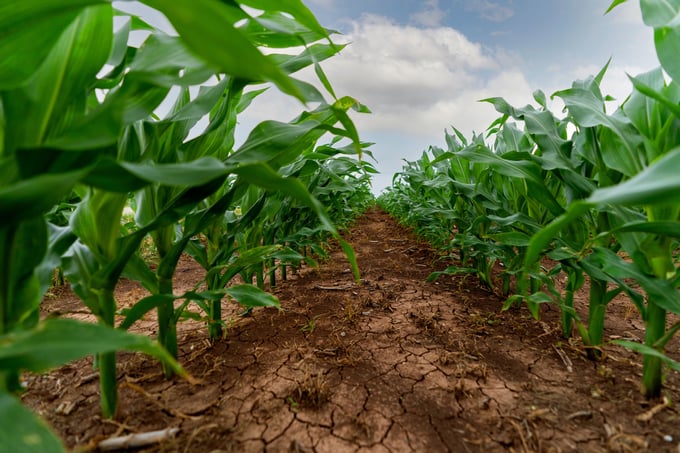May 28, 2025 | 10:50 GMT +7
May 28, 2025 | 10:50 GMT +7
Hotline: 0913.378.918
May 28, 2025 | 10:50 GMT +7
Hotline: 0913.378.918

Corn plantings continue around the state and many fields are emerged and progressing, but many producers are switching from corn due to drought conditions. Texas A&M AgriLife photo by Laura McKenzie.
Phosphorus, potassium, sulfur and nitrogen. All are traditional nutrients growers plan to put into soil each year to help maximize their yield potential. But did you know there are three other major components that are often overlooked?
Carbon, oxygen and hydrogen make up nearly 94% of the dry weight of the corn plant and play a pivotal role in grain yield. But they are rarely, if ever, part of a fertility plan. Instead, these nutrients are considered “freebies” because they do not need to be applied as fertilizer in crop production.
Carbon, oxygen and hydrogen are principal components of starch, protein, oil and fiber, which comprise about 85% of the final grain yield. The remaining 15% is water. They are important nutrients, but what can corn producers do to increase carbon, oxygen and hydrogen uptake?
The key to managing these essential nutrients is to manage soil water. If the soil contains too much water, mitochondria in the corn root cells suffocate from lack of oxygen and die, leading to overall root death.
If the soil contains too little water, evapotranspiration is limited, plant stomates close, and very little carbon dioxide and oxygen are captured in stomatal chambers. Reduced carbon dioxide levels limit the amount of carbon that is converted into sugar. Reduced oxygen levels inhibit mitochondrial respiration for energy production. Limitations of both functions reduce grain yield.
As long as soil water content is greater than the wilting point and not over field capacity, corn grows properly. Management practices to better ensure maximum corn growth and yield include:
Install tile drainage to more rapidly remove excess water during rainy periods.
Manage soil tillage to create a soil structure that allows maximum water percolation and capture from rain or irrigation.
Improve the soil structure to allow better water retention.
Conserve soil moisture by maintaining surface residue to reduce evaporation.
Fertilize properly to allow the corn plant to efficiently capture carbon.
Select hybrids that perform well in drier environments.
(farmprogress)

(VAN) Vikas Rambal has quietly built a $5 billion business empire in manufacturing, property and solar, and catapulted onto the Rich List.

(VAN) Available cropland now at less than five percent, according to latest geospatial assessment from FAO and UNOSAT.

(VAN) Alt Carbon has raised $12 million in a seed round as it plans to scale its carbon dioxide removal work in the South Asian nation.

(VAN) Attempts to bring down the price of the Japanese staple have had little effect amid a cost-of-living crisis.

(VAN) Fourth most important food crop in peril as Latin America and Caribbean suffer from slow-onset climate disaster.

(VAN) Shifting market dynamics and the noise around new legislation has propelled Trouw Nutrition’s research around early life nutrition in poultry. Today, it continues to be a key area of research.

(VAN) India is concerned about its food security and the livelihoods of its farmers if more US food imports are allowed.